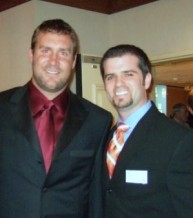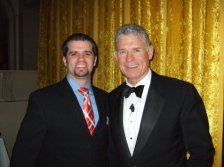
Day two of the Biennial was very productive. The second day begun again with Leonard Sweet, but this time he spoke about how Jews prayed (and still do) the psalms. He sought to bring to light the nature of Jesus’ words on the cross: “My God, my God, why have you forsaken me.” Of course, as most Bible students know, these are words from Psalm 22. Psalm 22 begins will sad words, but ends with a glorified understand standing of God’s power. In the ancient world, when you began a song most people would know the entire song. Today, if you sing “Amazing grace how…” most people could finish that first line because they know the song. Most Baptists will not understand the nature of a psalter, which many Christians sing on a regular basis in worship, because Baptists threw out any ritual that resembled Anglo-Catholic faith. I have learned the value and beauty of singing the Psalms as they were intended at the United Methodist congregation I served at for 2.5 years.
At lunch time, I attend the Ministers and Missionaries Benefit Board lunch. MMBB always does a great job of making an event nice. The MMBB money is well spent… err, I mean managed. Seriously, MMBB is one of the best retirement organizations for a denomination out there. MMBB’s performance usually beats the major indexes. I sat next to some International Mission people from the ABC and got the low down on the missionary situation.

![sfs_sweetlen_intro[1] sfs_sweetlen_intro[1]](http://onthebemainballston.files.wordpress.com/2009/06/sfs_sweetlen_intro1.jpg?resize=155%2C232) The first day of the American Baptist Churches Biennial in Pasadena, CA began Thursday. The major events of the day were special General Board events and other smaller group meetings. The biennial was still coming together yesterday as vendors and workers set up rooms and displays. I continue to discuss the “Missionary Situation” with many of my friends, colleagues, and other ABC attendees. In addition, I learned that one of bloggers on my blogroll,
The first day of the American Baptist Churches Biennial in Pasadena, CA began Thursday. The major events of the day were special General Board events and other smaller group meetings. The biennial was still coming together yesterday as vendors and workers set up rooms and displays. I continue to discuss the “Missionary Situation” with many of my friends, colleagues, and other ABC attendees. In addition, I learned that one of bloggers on my blogroll,  8 children, because it has been the “hot” celebrity news item. I try not to give any attention to “celebrity news” because it is not real news. The Jon and Kate story is news worthy on this blog because they are professed Christians and their situation is putting Christianity to the test in the eyes of secular viewers. Part of the show contains scenes of the family going to church, memorizing scripture, and reading Bible stories. Recently, the couple has gone through a dark time in their relationship, which has made news in just about every news outlet. Allegations of infidelity have plagued the show since the start of season 5. Questions have been raised regarding the couple staying together.
8 children, because it has been the “hot” celebrity news item. I try not to give any attention to “celebrity news” because it is not real news. The Jon and Kate story is news worthy on this blog because they are professed Christians and their situation is putting Christianity to the test in the eyes of secular viewers. Part of the show contains scenes of the family going to church, memorizing scripture, and reading Bible stories. Recently, the couple has gone through a dark time in their relationship, which has made news in just about every news outlet. Allegations of infidelity have plagued the show since the start of season 5. Questions have been raised regarding the couple staying together. Meteorology has always been a fascination of mine. I would watch the TV and check out the internet websites that forecasted major weather events like hurricanes and snowstorms. Weather storms are an interesting meteorological event. Storms can be predicted but never do they present themselves as the weather forecasters predict. Every summer and fall, hurricane predictors try to figure out how many major storms will hit land. As we have seen from hurricane Katrina, storms can catch us off guard and teach us that we must be careful how we prepare for storms.
Meteorology has always been a fascination of mine. I would watch the TV and check out the internet websites that forecasted major weather events like hurricanes and snowstorms. Weather storms are an interesting meteorological event. Storms can be predicted but never do they present themselves as the weather forecasters predict. Every summer and fall, hurricane predictors try to figure out how many major storms will hit land. As we have seen from hurricane Katrina, storms can catch us off guard and teach us that we must be careful how we prepare for storms.


 Several news outlets, including the Associated Press and
Several news outlets, including the Associated Press and 

 (not that bad), and algebra II (got C’s and past, barely). I took at practical math class my senior year in high school where I learn to balance a check book, learned about mortgages, understood the stock market, and all sorts of practical mathematical concepts. I got A’s in that class! The issue I found with mathematics is that the vast majority of equations and problems you have to solve have one answer. For some reason, my mind was more suited to the humanities like government, history, art, and english (sort of). In those classes, the answer was usually subjective. In the humanity classes, thinking and discussing were at the center of learning. Memorizing math formulas and the rules of math was difficult. Every time I got a concept in math class we would move on to another concept. I could not keep up!
(not that bad), and algebra II (got C’s and past, barely). I took at practical math class my senior year in high school where I learn to balance a check book, learned about mortgages, understood the stock market, and all sorts of practical mathematical concepts. I got A’s in that class! The issue I found with mathematics is that the vast majority of equations and problems you have to solve have one answer. For some reason, my mind was more suited to the humanities like government, history, art, and english (sort of). In those classes, the answer was usually subjective. In the humanity classes, thinking and discussing were at the center of learning. Memorizing math formulas and the rules of math was difficult. Every time I got a concept in math class we would move on to another concept. I could not keep up! ven though it takes three different modes. The same can be said of the Trinity. God is still God, but just in three forms that share similar properties made up of one substance. It’s crazy, I know. Similes and metaphors get us close to an idea, but never fully explain it. Trying to explain God is like trying to explain an emotion. Words that can fully describe it. How do you describe the Divine? How do you describe something greater than ourselves? We have some pretty good ways of describing God, but nothing can fully explain God. There is a certain mystery there that we are meant to be in awe of.
ven though it takes three different modes. The same can be said of the Trinity. God is still God, but just in three forms that share similar properties made up of one substance. It’s crazy, I know. Similes and metaphors get us close to an idea, but never fully explain it. Trying to explain God is like trying to explain an emotion. Words that can fully describe it. How do you describe the Divine? How do you describe something greater than ourselves? We have some pretty good ways of describing God, but nothing can fully explain God. There is a certain mystery there that we are meant to be in awe of. 


You must be logged in to post a comment.